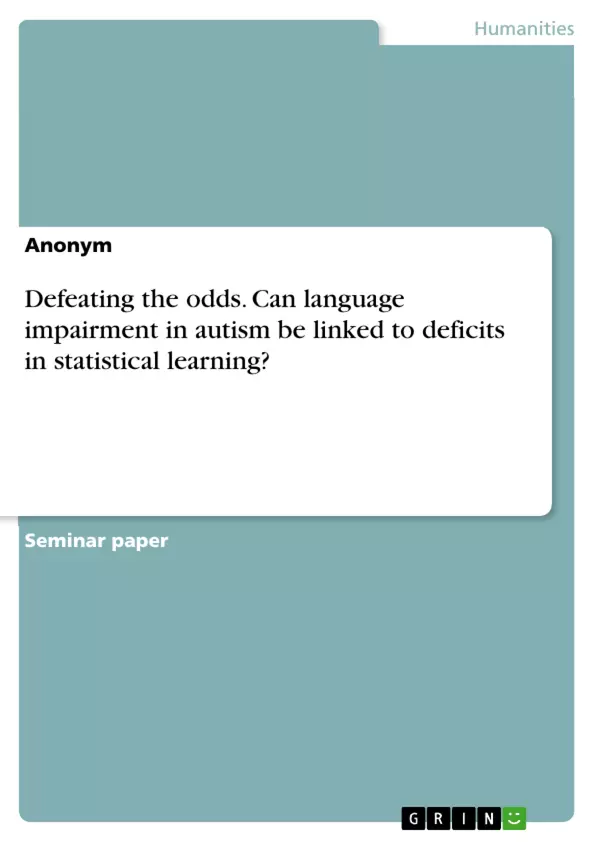Can language impairments in autism be linked to deficits in statistical learning? Answering this question is of interest for multiple reasons: It may shed more light on the general mechanisms of language acquisition and development and illustrate how statistical learning contributes to the ability to communicate. Furthermore, understanding the underlying mechanisms of linguistic impairments associated with autism and other disorders is imperative in order to develop effective therapeutic methods and interventions to help those affected, preferably at an early stage in life.
Inhaltsverzeichnis (Table of Contents)
- Language Impairment and Autism
- Statistical Learning in Autism
- Word Segmentation Tasks and the Procedural Deficit Hypothesis
- Studies on Statistical Learning in Children with Autism
- Mayo and Eigsti (2012)
- Haebig et al. (2017)
- Scott-Van Zeeland et al. (2010)
Zielsetzung und Themenschwerpunkte (Objectives and Key Themes)
This paper investigates the potential link between language impairments in autism and deficits in statistical learning. The primary goal is to examine whether individuals with autism demonstrate impairments in statistical learning, particularly in the context of word segmentation tasks. The research aims to contribute to our understanding of the mechanisms underlying language acquisition and development, specifically exploring the role of statistical learning in communication.
- Language impairments in autism
- Statistical learning in language acquisition
- Word segmentation tasks and their relevance for understanding language deficits in autism
- The procedural deficit hypothesis (PDH) and its implications for language impairments
- Neural activity associated with statistical learning in individuals with autism
Zusammenfassung der Kapitel (Chapter Summaries)
The paper begins by introducing the prevalence of language impairment in autism and its impact on communication. It then delves into the concept of statistical learning and its potential role in language development. The authors discuss the procedural deficit hypothesis (PDH) as a possible explanation for language impairments in autism, suggesting that deficits in procedural learning, particularly in statistical learning, might underlie these challenges. The main body of the paper focuses on three studies that investigated statistical learning in children with autism. The studies by Mayo and Eigsti (2012) and Haebig et al. (2017) compared the performance of children with autism and typically developing (TD) children on word segmentation tasks, while Scott-Van Zeeland et al. (2010) examined neural activity during word segmentation tasks using functional magnetic resonance imaging (fMRI).
Schlüsselwörter (Keywords)
The primary keywords of this paper are: autism, language impairment, statistical learning, word segmentation, procedural deficit hypothesis, neural activity, fMRI. The paper focuses on exploring the relationship between statistical learning and language deficits in autism, particularly examining the performance of individuals with autism on word segmentation tasks.
Frequently Asked Questions
What is statistical learning in the context of language?
Statistical learning is the ability to extract patterns and regularities from environmental input, such as identifying word boundaries in fluent speech.
How is autism linked to language impairment?
Many individuals with autism face challenges in communication, which may stem from deficits in how they process and learn linguistic structures.
What is the Procedural Deficit Hypothesis (PDH)?
The PDH suggests that language disorders in autism are caused by impairments in the brain's procedural memory system, which handles rule-based learning.
What do word segmentation tasks reveal about autism?
These tasks test if children can identify "words" in a stream of nonsense syllables; deficits here suggest a problem with statistical learning mechanisms.
Can fMRI show differences in how people with autism learn language?
Yes, studies use fMRI to observe neural activity during learning tasks, often finding different activation patterns in individuals with autism compared to typical developers.
- Quote paper
- Anonym (Author), 2019, Defeating the odds. Can language impairment in autism be linked to deficits in statistical learning?, Munich, GRIN Verlag, https://www.grin.com/document/1244473



